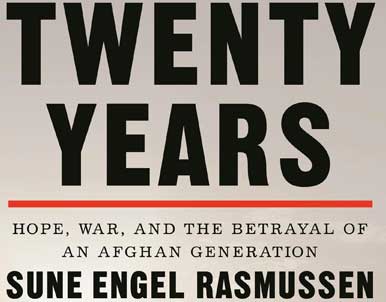Brendan’s Alternate Tagline for Twenty Years:
Plenty of rage to go around.
Quick synopsis:
A look at the war in Afghanistan through the eyes of various Afghans.
Fact for Non-History People:
In the 1980s, Afghans in Iran and Pakistan made up nearly half of the world’s population of refugees.
Fact for History Nerds:
The U.S. supplied more than $2 billion dollars’ worth of aid as the Afghans fought the Soviet Union.
My Take on Twenty Years:
When I started Sune Engel Rasmussen’s Twenty Years, I knew this would be a challenging read for me. For anyone who reads my reviews regularly, they know I am not shy about pointing out I am a U.S. Army Veteran and spent a tour in Iraq as a tank platoon leader. Rasmussen makes no qualms about what Twenty Years is about. It is about the failure of the Taliban, the U.S., and quite frankly the world when it comes to giving the Afghan people the lives they deserve. This is especially true for the people who stood up to the Taliban and tried to create a new nation under foreign direction and guidance (or occupation if you want to see it that way).
The challenge for me comes in the fact that Rasmussen is not complimentary in any way to these groups. This is not a criticism, and my rating of the book is not colored by this. In fact, I appreciated Rasmussen’s willingness to point out when mistakes were well meaning but became disasters. Rasmussen’s summary of U.S. actions can be mostly described as benevolent incompetence with some episodes of malice. He does balance this out quite a bit because he won’t give the Taliban the same courtesy. They are good administrators, but only because they kill people on a whim and horribly oppress all women. In essence, Rasmussen acts like the writers of South Park. Everyone is fair game for censure.
The problem for me is that is it very difficult to be unbiased in my reading of this. One of the book’s subjects, Omari, is a Taliban operative who openly brags about killing American soldiers. To put it lightly, I don’t like Omari, and I have a visceral reaction to him. It made me think for a few minutes that I can’t possibly give this book a good rating because it gave this person the time of day. Then, Rasmussen kept writing about Omari. I won’t say too much, but Omari may not be the true believer he thought he was. His views may differ quite a bit from the people he thought he was fighting with and for.
Thanks for making it this far in my therapy session! I owe you a review and here it is. Rasmussen has written an extremely engaging narrative with some fascinating people. Zahra alone is worth a biography of her own and I would read the hell out of it. Her battle with an abusive husband with almost no support is heartbreaking. Parasto is a close second as a woman who is constantly fighting to make her country better. Their lives are rich with detail and insight into the real Afghanistan and the fallout from everything post-9/11. And while Omari is not someone I enjoyed reading about, his story is vital in understanding a certain point of view. That point of view is currently ruining women’s lives, but it exists and shouldn’t be ignored because it is a major component of the current political climate.
My criticism of the book would be the number of characters. The ones I already mentioned provided enough fodder for the reader to understand the stakes. Other characters, such as Fahim, come and go with little added to the overall narrative. Other characters only show up towards the very end of the book. They don’t destroy the flow, but I think it all could have been streamlined.
I would recommend this with a bit of caution to the reader. I have friends who served in Afghanistan and would wholeheartedly endorse everything in this book. They are enraged at how the people of Afghanistan who fought alongside them were left to rot. I have other fellow vets who would consider this a hit job which completely ignores any positive aspects of U.S. military intervention. I have sympathy (and some convictions) with both outlooks.
My review is therefore based solely on how well the book is written and how well it makes the point that Rasmussen wanted to make. I believe he succeeds in making this an eye-opening look at the War in Afghanistan.
(This book was provided as an advance copy by Netgalley and Farrar, Straus and Giroux.)
Verdict:
Good, but may not be for all audiences. Buy it here!


Leave a Reply
You must be logged in to post a comment.